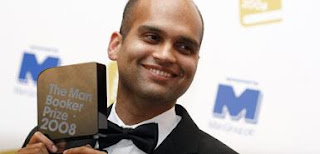 Aravind Adiga, author of The White Tiger, said in an interview in the Guardian the day after he won the Man Booker Prize, “At a time when India is going through great changes and, with China, is likely to inherit the world from the west, it is important that writers like me try to highlight the brutal injustices of society. That's what writers like Flaubert, Balzac and Dickens did in the 19th century and, as a result, England and France are better societies. That's what I'm trying to do – it's not an attack on the country, it's about the greater process of self-examination.”
Aravind Adiga, author of The White Tiger, said in an interview in the Guardian the day after he won the Man Booker Prize, “At a time when India is going through great changes and, with China, is likely to inherit the world from the west, it is important that writers like me try to highlight the brutal injustices of society. That's what writers like Flaubert, Balzac and Dickens did in the 19th century and, as a result, England and France are better societies. That's what I'm trying to do – it's not an attack on the country, it's about the greater process of self-examination.”This is most interesting to someone like me whose parents left India so that their children could have a better life, free of poverty and communal/political violence. Most of us who are here from other parts of the world are here because our fore-parents came searching for opportunity, or because they were fleeing persecution -- beginning with European settlers.
Now, India and China are projected to be the next world economic super-powers. Ironic, innit? And as India goes through adjusting to this new change, her citizens experience the growing pains that go along with it. It reminds me of the younger sibling always trying to keep up with the older one, looking up to big brother, and then BANG, realizing they can outrun them. There's got to be a bit of an identity crisis there.
All this time longing for western acknowledgment and recognition, and now it comes in the form of social critique a la Slumdog Millionaire and The White Tiger. At a time when middle and upper class Indians can finally proclaim, "we've arrived. And we're just like you -- we have cell phones and luxuries and wealth," western media turns its eye on the social and economic disparities. The ugly underbelly of poverty and injustice.
But I agree with Adiga: at some point, India will realize she's running her own race now. She has outrun big brother and must now turn inward to create her own definition of who she is. She must look at that ugly underbelly and create a new way of defining "success." As we've all seen too often, a nation's success isn't about the five percent of the population who drive fancy cars and chat on cell phones. This is a great opportunity for the emerging super-powers; it's a chance to step up as leaders and really get it right this time. To put what's important -- the value of human life -- first.
Will it happen? I have hope. After all, these are the nations that birthed Buddha, Gandhi, Yoga, tie-dye, and Feng Shui.






No comments:
Post a Comment